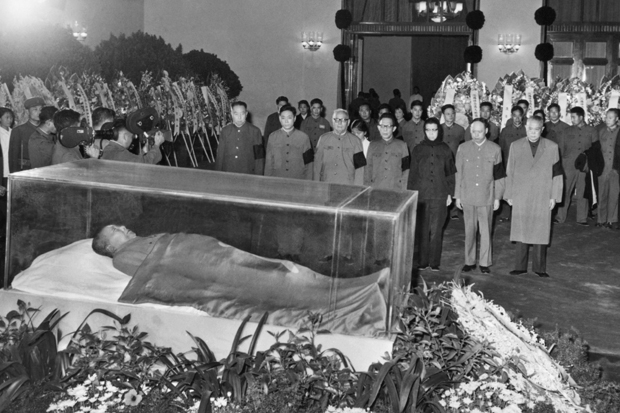‘I just wanted the damn story to ask the right questions,’ sighs a disaffected journalist in Jack Livings’s debut collection of short stories, The Dog. Two other new short story collections, Lucky Alan by Jonathan Lethem and Jellyfish by Janice Galloway, are less interested in asking the right questions than in the opportunities for missing the point.
Livings draws upon his experience as a student in Beijing to create a compelling vision of China from the Cultural Revolution to the present day. Though inclined to excessive lyricism (a thief is ‘waste-water wrung from the sponge of the world’), Livings has a keen eye for detail and a knack for dialogue. Stories range from a portrait of a gangster in Beijing’s Uighur community to that of a couple who resolve to eat their champion racing dog. The collection’s centrepiece is an account of the pains taken to create a crystal sarcophagus for Mao Zedong. These are essentially parables about ‘the party’s ability to whip citizens into a storm that could flatten everything in its path’: we watch Livings’s characters as they struggle to fit their private consciences to the state’s slippery definition of good citizenship.
The ‘oblivious solid citizens’ and ‘good-egg sleazeballs’ of Jonathan Lethem’s Lucky Alan are equally well-meaning. In ‘Their Back Pages’, a highfalutin theatre critic aspires to a society ‘bounded by the strict gutters and panels of decency’ and in ‘Procedure in Plain-Air’, the protagonist, Stevick, is congratulated for his altruism. But it’s hard to trust the judgment of a critic stranded on a volcanic island with a cast of comic-book characters; and Stevick has just spent hours standing over a manhole with an umbrella — a misguided effort to protect the person trapped inside from the rain. Don’t hope for logical plots. Lethem’s verbal flashiness is the true lifeforce of the book. When the comic-book characters run out of food they resort to eating their speech bubbles, ‘edges gently browned’.
Janice Galloway, too, knows the allure of the surreal. Her characters wallow in a semi-waking state often compared to being underwater. ‘This is a deep sea tank,’ she tells us. ‘You are at the bottom.’ But the collection as a whole is anchored by a preoccupation with motherhood. In the title story a mother berates herself for being too soft, like the jellyfish she finds stranded on the beach, stamped on by human feet. In another a newly single mother picks up her child, ‘making his leg flop, like something filleted’. In the final story a mother escapes her family altogether, horrified by the sight of her son’s blood. Each strives to do the best for her child, but regresses into childishness.
In an afterword to Jellyfish, Galloway claims that publishers are shy of short stories ‘like people are shy of three-legged puppies’. These three short story collections are mongrel forms, often savage to their characters and suffering the occasional amputation when it comes to an ending. But they are steady on their feet.






Comments